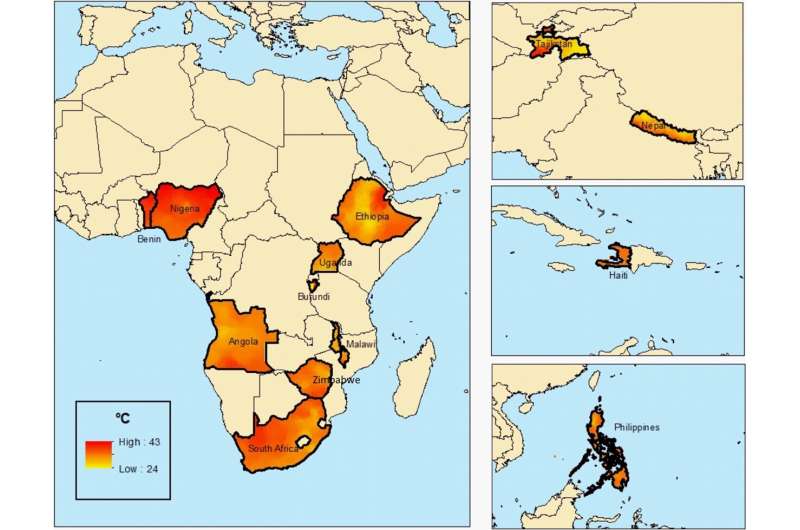First link between stillbirths, birth complications and excessive heat in lower-income countries

Scientists at UC San Diego and colleagues have found links between extreme heat and a heightened incidence of stillbirths and preterm births in relatively poor countries.
The study, published Oct. 6 in the journal Environment International, is believed to be the first to link the two phenomena in a global context.
“We notably found that experiencing higher maximum temperatures and smaller diurnal temperature range during the last week before birth increased the risk of preterm birth and stillbirth,” wrote a research team including first author Sara McElroy, who recently completed a Ph.D. in epidemiology in the San Diego State University/UC San Diego Joint Doctoral Program in Public Health. “This study is the first global assessment of extreme heat events and adverse birth outcomes.”
The research, coordinated by climate scientists and epidemiologists at UC San Diego’s Scripps Institution of Oceanography and the Herbert Wertheim School of Public Health and Human Longevity Science, overcomes a barrier presented by the dearth of daily temperature and health information from economically developing countries. The team used gridded global meteorological data and compared it to available health survey information in 14 low- and middle-income countries compiled by the U.S Agency for International Development.
There have been data collected in relatively affluent countries to indicate links between pregnancy outcomes and environmental extremes such as heat waves, ice storms and wildfires. Other previous studies in high-income countries have established that pregnant women toward the end of the gestational period are especially vulnerable to extreme heat as it affects their ability to stay hydrated and to keep cool through sweating.
Those data, say the researchers, are not necessarily indicative of what is happening in other geographical settings. High levels of poverty in developing countries act not only to make meteorological and health data-gathering rare within their borders but also make pregnant women more vulnerable to weather extremes because they are less likely to benefit from technologies and services such as perinatal health services, air conditioning, and other social determinants of health.
The researchers linked birth-outcome data with weather data in 14 countries such as the Philippines, Nepal, South Africa, and Tajikistan. They evaluated more than 103,000 births and counted nearly 5,900 preterm births and 1,200 stillbirths among them. They found a strong correlation between extreme heat events endured by pregnant women in the last week of their pregnancy and their risk of such adverse birth outcomes.
“We brought attention to new evidence on the relationship between extreme heat and adverse birth outcomes in countries where the evidence has been scarce,” said McElroy. “Our analyses revealed an association between acute exposure to heat and increased risk of preterm birth and stillbirth and suggests differing critical windows of susceptibility to extreme heat for preterm birth and stillbirth.”
Authors advocate for improvement or establishment of early-warning weather systems to enable pregnant women and their caregivers to prepare them for extreme heat events such as heat waves.
Source: Read Full Article



